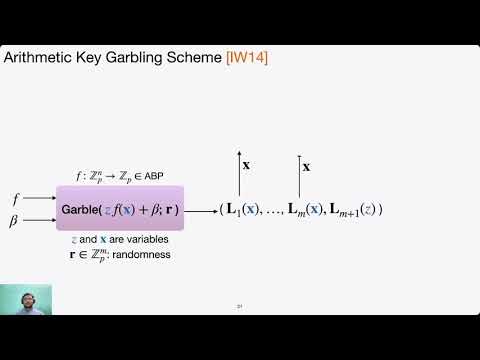CryptoDB
(Compact) Adaptively Secure FE for Attribute-Weighted Sums from k-Lin
| Authors: |
|
|---|---|
| Download: | |
| Presentation: | Slides |
| Conference: | ASIACRYPT 2021 |
| Abstract: | This paper presents the first adaptively simulation secure functional encryption (FE) schemes for attribute-weighted sums. In such an FE scheme, encryption takes as input N pairs of attribute {(x_i, z_i )}_{i \in [N]} for some N \in \mathbb{N} where the attributes {x_i}_{i \in [N]} are public while the attributes {z_i}_{i \in [N]} are private. The indices i \in [N] are referred to as the slots. A secret key corresponds to some weight function f, and decryption recovers the weighted sum \sum_{i \in [N]} f(x_i)z_i. This is an important functionality with a wide range of potential real life applications. In the proposed FE schemes attributes are viewed as vectors and weight functions are arithmetic branching programs (ABP). We present two schemes with varying parameters and levels of adaptive security. (a) We first present a one-slot scheme that achieves adaptive security in the simulation-based security model against a bounded number of ciphertext queries and an arbitrary polynomial number of secret key queries both before and after the ciphertext queries. This is the best possible level of security one can achieve in the adaptive simulation-based framework. From the relations between the simulation-based and indistinguishability-based security frameworks for FE, it follows that the proposed FE scheme also achieves indistinguishability- based adaptive security against an a-priori unbounded number of ciphertext queries and an arbitrary polynomial number of secret key queries both before and after the ciphertext queries. Moreover, the scheme enjoys compact ciphertexts that do not grow with the number of appearances of the attributes within the weight functions. (b) Next, bootstrapping from the one-slot scheme, we present an unbounded-slot scheme that achieves simulation-based adaptive security against a bounded number of ciphertext and pre-ciphertext secret key queries while supporting an a-priori unbounded number of post-ciphertext secret key queries. The scheme achieves public parameters and secret key sizes independent of the number of slots N and a secret key can decrypt a ciphertext for any a-priori unbounded N. Further, just like the one-slot scheme, this scheme also has the ciphertext size independent of the number of appearances of the attributes within the weight functions. However, all the parameters of the scheme, namely, the master public key, ciphertexts, and secret keys scale linearly with the bound on the number of pre-ciphertext secret key queries. Our schemes are built upon asymmetric bilinear groups of prime order and the security is derived under the standard (bilateral) k-Linear (k-Lin) assumption. Our work resolves an open problem posed by Abdalla, Gong, and Wee in CRYPTO 2020, where they presented an unbounded-slot FE scheme for attribute-weighted sum achieving only semi-adaptive simulation security. At a technical level, our work extends the recent adaptive security framework of Lin and Luo [EUROCRYPT 2020], devised to achieve compact ciphertexts in the context of indistinguishability-based payload-hiding security, into the setting of simulation-based adaptive attribute-hiding security. |
Video from ASIACRYPT 2021
BibTeX
@inproceedings{asiacrypt-2021-31392,
title={(Compact) Adaptively Secure FE for Attribute-Weighted Sums from k-Lin},
publisher={Springer-Verlag},
doi={10.1007/978-3-030-92068-5_15},
author={Pratish Datta and Tapas Pal},
year=2021
}

